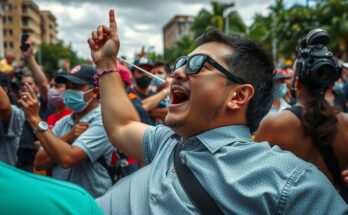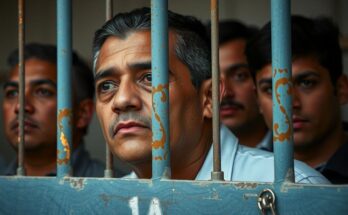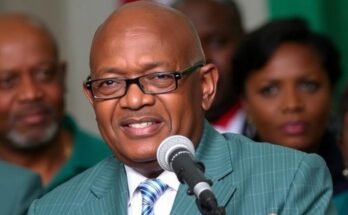Former President John Mahama faces off against Vice President Mahamudu Bawumia in Ghana’s competitive December 7 elections. Mahama pledges to enhance the economy through a 24-hour business framework, while Bawumia focuses on ongoing strengths despite economic challenges. Voter sentiment reveals a desire for change, with pressing issues, especially inflation and economic recovery, taking precedence in decision-making.
Ghana is gearing up for a highly competitive national election on December 7, 2023. Former President John Mahama of the National Democratic Congress is poised to challenge the ruling party’s candidate, Vice President Mahamudu Bawumia of the New Patriotic Party. Mahama promises to revitalize the economy by establishing a 24-hour business environment, aspiring to bolster job creation and address the aftermath of a significant $30 billion external debt default in 2022. Conversely, Bawumia affirms his dedication to strengthen the economy despite the challenges posed by post-COVID recovery and inflation hitting historic highs of 54% over the past 18 months.
Since 1992, Ghana’s political landscape has been dominated by the two major parties: NDC and NPP, a trend expected to persist in this election cycle. Senior lecturer at the University of Ghana, Kwame Asah Asante, states, “It’s the dominant parties; one of them is going to carry the day.” Nonetheless, public sentiment indicates a desire for change among some voters. Concerns surrounding pressing national issues such as infrastructure, health care, education, and corruption are paramount, yet the economy stands out as the most urgent issue influencing voter decisions.
The global environment has compounded Ghana’s economic difficulties, particularly following the COVID-19 pandemic and the war in Ukraine, which has led to significant grain supply disruptions. Asante emphasizes that “the economy will play an important role because it’s a bread-and-butter issue.” Voters like Wisdom Gavor and Janet Bawah express dissatisfaction with current economic conditions and support Mahama’s vision for a transformative 24-hour economy. Meanwhile, supporters of Bawumia credit him with advancements, particularly the digitization of economic systems that have improved operational efficiency.
In addition to Mahama and Bawumia, new independent candidates such as Nana Kwame Bediako are also generating interest, particularly among the youth seeking alternatives to the established parties. While Bediako has yet to garner significant traction, his presence may influence the dynamics of the election.
As the election approaches, the stakes remain high, and voter sentiment appears split between a desire for continuity under the NPP and a push for change represented by the NDC. The outcomes could potentially lead to a runoff should smaller parties perform well enough to challenge the two giants, making this election one of the most closely watched in Ghana’s recent political history.
Ghana’s elections have historically been models of democratic resilience in a region often marked by instability. Since the onset of multiparty democracy in 1992, the political arena has been largely defined by the rivalry between the National Democratic Congress (NDC) and the New Patriotic Party (NPP). Recent years have seen Ghana grappling with significant economic challenges, including a $30 billion external debt default, reputational issues stemming from corruption, and the impact of global disruptions like the COVID-19 pandemic and the Ukraine war. As the December elections loom, economic recovery is placed at the forefront of political discourse, highlighting the electorate’s priorities amidst persistent social and infrastructural issues.
In conclusion, Ghana’s upcoming elections are expected to be fiercely contested, with former President John Mahama positioning himself as a serious contender against the ruling Vice President Mahamudu Bawumia. Economic recovery and stability will be crucial factors influencing voter sentiment, as citizens navigate their choices between continuity and change. The potential rise of independent candidates adds an intriguing layer to an election that may reshape Ghana’s political landscape. Ultimately, the outcome will reflect not only the will of the electorate but also the pressing need for solutions to the issues that have long plagued the nation.
Original Source: www.voanews.com




